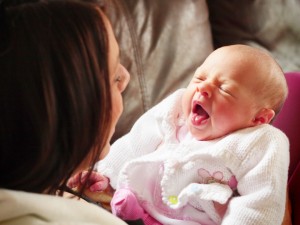
While depression is the leading cause of disability for both males and females, the burden of depression is 50% higher for females. In fact, depression is the leading cause of disease burden for women in both high-income and low- and middle-income countries (WHO, 2008).
Research has shown that women with unidentified and untreated maternal depression may negatively affect their children’s mental health, with estimates of mild to moderate depression in the first few months after birth ranging from 10% to 20% (O’Hara, 1996).

Post-natal depression is defined as an episode of depression occurring within a year after the birth of a child
Post-natal depression (PND) is defined as an episode of depression occurring within a year after the birth of a child. Stressful life events and a lack of social support increase the mother’s risk of developing PND (Chaudron, 2003). Children of depressed mothers are also reported to be at a higher risk of mood disorders in later life, as are partners of mother’s with PND.
An initiative in Australia (Beyond Blue) recommends that mothers are screened in the antenatal and postnatal period for PND. However, this approach relies on mothers attending well-child clinics. Mothers with PND symptoms are less likely to attend scheduled appointments, and more likely to use Emergency Departments (EDs) (Minkovitz et al, 2005). As visits to emergency departments are relatively common with infants, screening for prevalence of PND in EDs could identify mothers who need help, where they have not been identified as having PND in other settings.
Methods
Stock et al (2012) conducted a prospective observational study of the prevalence of PND in mothers of infants aged 14 days to 6 months, presenting with non-critical conditions to an emergency department (ED) in Melbourne, Australia. The main measure used to determine PND was the Edinburgh Post Natal Depression Scale (EPDS), a widely used and researched scale for PND. Mothers were asked to complete the EPDS post-triage and before seeing a doctor. All mothers were offered a ‘maternal care pack’ containing information about PND, whether they took part in the study or not. Those who returned a positive screen, or answered that they had experienced suicidal ideation were offered a further social work assessment.
200 mothers participated in the study. The mean age of the infants was 3.6 months. The maternal mean age was 30.9 years. Most mothers were partnered and delivered their child by a vaginal birth. More than half had other children and were university-educated.
Results

The study showed a high prevalence (16%) of postnatal depression in mothers presenting at the emergency department
- 39% of mothers in the study had experienced symptoms of depression before
- 16% screened positive for PND, and 53% of the total sample had not completed the EPDS before their visit to the ED
- 4% of the women with a negative screen for PND, reported that they had experienced suicidal ideation.
A univariate analysis of associations based on baseline information and demographics shows that mothers with a positive screen proved strong associations with a history of depression, single parent status, indigenous status or a crying baby as the main presenting problem.
Conclusion
At the time of publication no similar studies had been conducted that specifically investigated the prevalence of PND in mothers attending EDs with their infants. Although this is a small scale study conducted in one specific hospital in Melbourne, the results show a high prevalence (16%) of PND in mothers presenting at the ED.
A large scale study completed in Australia, which screened 12,000 mothers for PND in the community, found a prevalence rate of 7.6% using the same measure (Buist and Bilszta, 2006). This study shows a prevalence of more than double that in the community. Furthermore, more than half of the total sample group had not previously been screened for PND. This indicates the potential for mothers presenting at EDs not to have their PND identified and to go unsupported.
The study shows that screening for PND in emergency departments could increase the likelihood of PND being detected. Also, it was found that mothers with PND were 4.8 times more likely to have a history of depression than mothers who screened negatively. This indicates the need to monitor new mothers who have experienced depression in the past.

Tracking and supporting mothers to recognise early symptoms of depression is vital if we are to help the thousands of women who experience postnatal depression.
Photo courtesy of ADS Ltd
As a mother who has recently experienced PND, the difficulty in getting healthcare practitioners to recognise that my anguish, my weight-loss, my sleeplessness and my inability to cope with the tiniest of challenges could be attributed to depression, was a long and drawn out process. I can confirm that mothers with babies who do present with non-urgent physical symptoms, or those that tend to cry a lot, often have their own support needs, both physical and mental.
Although in my case I did ask my healthcare providers for help, I was often pushed towards trying to explain my sheer exhaustion and physical decline through physical health investigations. Unlike some mums with PND, I didn’t experience problems with attachment to my child, I became hyper-vigilant instead, constantly worrying about my daughter’s well-being. This meant that I did attend the GP practice, and Accident and Emergency, on a number of occasions with my daughter, although for genuine reasons (she suffered reflux for the first year of her life). Not once did anyone ask me how I was feeling, in fact one Doctor suggested I was neurotic.
If I hadn’t stumbled upon a GP who was willing to listen, I don’t know what my prognosis would have been. As a result my PND lasted around 2 ½ years, my daughter is now 4. I’m only just able to talk about my experiences; some of this is down to the stigma surrounding mental health – a stigma that I have been trying to fight for the last 12 years to help others. If we are to help mothers in similar situations, routine screening for PND is vital, not only in the GP Practices, or through other post-natal health care providers, but in places that mothers who haven’t accessed services might present.
PND can be prevented, especially in mothers with a previous history of depression. Tracking and supporting mothers to recognise early symptoms of depression is vital if we are to help the thousands of women who experience PND. Useful information about PND can be found on the NHS Choices website.
Links
Stock A, Chin L, Babl FE, Bevan CA, Donath S, Jordan B. Postnatal depression in mothers bringing infants to the emergency department. Arc Dis Child 2012; 00:1-5. [PubMed abstract]
Buist A, Bilszta J. The beyondblue National Postnatal Screening Program. Prevention and Early Intervention 2001-2005, Final Report. Vol 1 (PDF). Melbourne, Beyondblue: the National Depression Initiative, 2006
Chaudron LH. Postpartum depression: what paediatricians need to know (PDF). Pediatric Review 2003; 24:154-61
Minkovitz CS, Strobino D, Scharfstein D, et al. Maternal depressive symptoms and children’s receipt of health care in the first 3 years of life. Pediatrics 2005; 115: 306-14
O’Hara, MW; Swain, AM. Rates and risk of postpartum depression: a meta-analysis. International Review of Psychiatry 1996; 8:37-54 [Abstract]
The Global Burden of Disease 2004 update (PDF). World Health Organization, 2008.


@Mental_Elf so important to detect PND. Suffered myself without help & ended up with major depression later on in life.Help up front vital
Mothers who bring their babies to emergency departments often have undetected post-natal depression http://t.co/RaM6Lvzev0 via @Mental_Elf
@Ermintrude2 @mental_elf
Lovely to see a rare pic of a Breastfeeding mum. Pity in a way that that’s been chosen to illustrate depression.
@itsmotherswork @Mental_Elf I assumed the picture was to present motherhood rather than relate specifically to article content.
@Ermintrude2 @mental_elf
I might have assumed that too if it hadn’t been for the caption. Because of the time I’ve spent supporting….
@Ermintrude2 @mental_elf
…Breastfeeding mums, I’m hyper aware of how bf images are used. More often than not bf mums are portrayed alone
@Ermintrude2 @mental_elf
(except for their baby, obvs) and bottle-feeding mums with their partner and wider family. This is especially…
@Ermintrude2 @mental_elf
…so when they are depicted in materials produced by the formula-manufacturers, but seems to impact on the way..
@itsmotherswork @Mental_Elf I must say I didn’t think so deeply. Just thought it was a good piece but shows how our experiences flavour..
@itsmotherswork @Mental_Elf our perceptions of images.
@Ermintrude2 @mental_elf
…they are featured elsewhere.
I know one can’t fight on all fronts at once.
:-/
@itsmotherswork @Mental_Elf I just thought it was a nice picture illustrating new motherhood and an interesting post. I didn’t think much
@itsmotherswork @Mental_Elf better than disembodied hands or zimmer frames with no faces to denote age or dementia.
@itsmotherswork @Mental_Elf or person sobbing into hankie, face obscured. At least there’s a face in the photo!
Don’t miss this great debut blog on postnatal depression from @DrFifiWG http://t.co/ZL0SdwYnCU
Read my first blog on PND http://t.co/y7d5c0Kq1V
mothers who bring their babies to emergency departments often have undetected post-natal depression http://t.co/5DEc4cPvrf via @sharethis
@TimetoChange Read my debut blog on post-natal depression and some of my own personal experiences http://t.co/YP5oEu4UfP @Mental_Elf
Really like mix of science and personal experience in @DrFifiWG’s post-natal depression blog on @Mental_Elf site http://t.co/BGINpGea8l
Read my debut blog on Post Natal Depression for the Mental Elf http://t.co/XaowCEs3hf
Rt @DrFifiWG: Read my debut blog on post-natal depression and some of my own personal experiences http://t.co/BGINpGea8l via @Mental_Elf
New study finds a high prevalence (16%) of postnatal depression in mothers presenting at the emergency dept http://t.co/ZL0SdwYnCU
RT @Mental_Elf: New study finds a high prevalence of postnatal depression in mothers presenting at the emergency dept http://t.co/Ok9rHKM4TN
ALWAYS ask how Mum is – with eye contact: MT “@Mental_Elf: Mums bringing babies to ED may have postnatal dpression http://t.co/k4TE7H2ppu”
Should we be screening for postnatal depression in emergency departments? http://t.co/ZL0SdwYnCU
@Mental_Elf Yes.
@Mental_Elf Not sure how you could but yes. Don’t think I would have been truthful at the time
@Mental_Elf The ER depts are the ‘gatekeepers’ and it is at that stage that a nurse practitioner could screen all mental health related prob
“@Mental_Elf: Should we be screening for postnatal depression in emergency departments?’ Hell yes! My PND – worst time of my life :-/
RT @mental_elf: Should we be screening for postnatal depression in emergency departments? http://t.co/tQWFTxVsoL =
I wonder to what degree PND is linked to long term, chronic, sleep depriving stressful conditions such as reflux which (due to dreadful misdiagnosing by GPs and HVs) often necessitates a trip to A&E just to get decent care?
@DrFifiWG on her own experiences of postnatal depression & new study of mothers presenting in emergency depts http://t.co/ZL0SdwYnCU
Missing you Mum: mothers who bring their babies to emergency departments often have undetected post-natal depr… http://t.co/RxwsDKGkIk
In case you missed it: Mothers who bring babies to emergency depts often have undetected postnatal dpression http://t.co/ZL0SdwYnCU
@mental_elf hmm. Many mothers have undetected pnd.
Missing you Mum: many mothers who bring their babies to emergency departments often have undetected post-natal d http://t.co/X6p3g7bmVJ